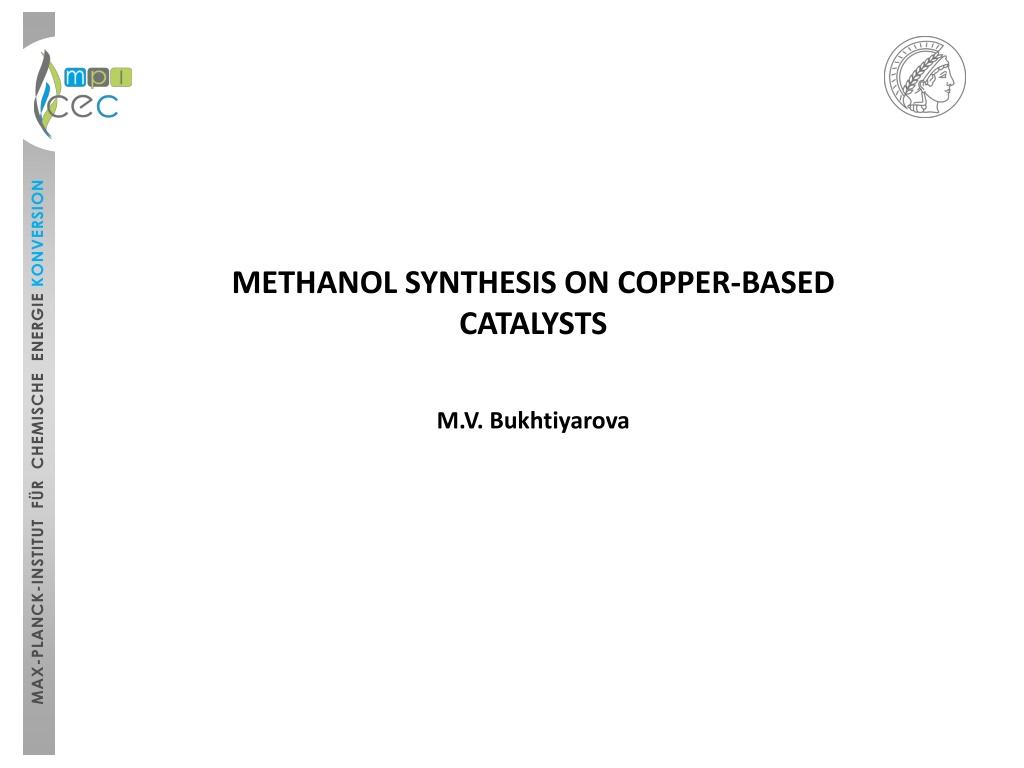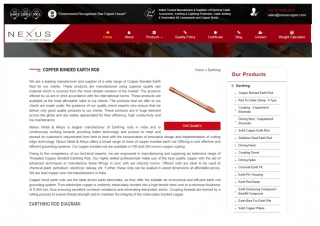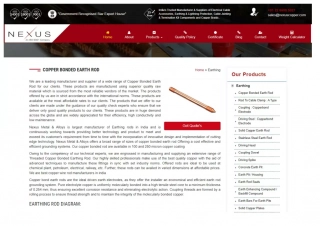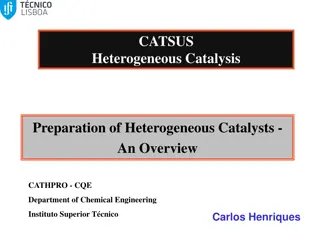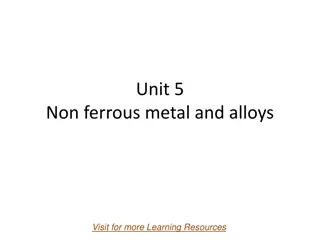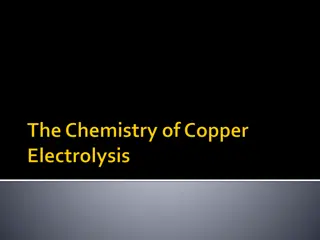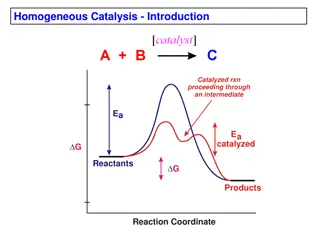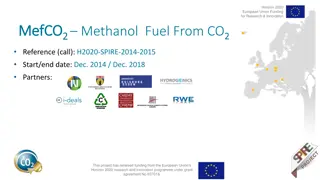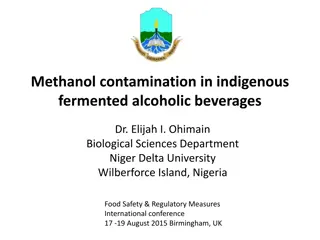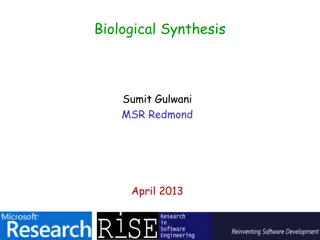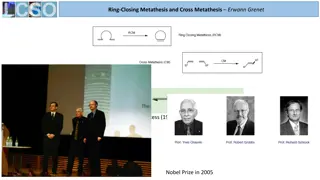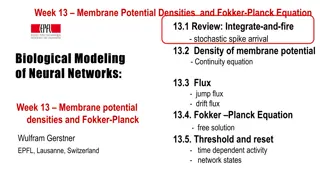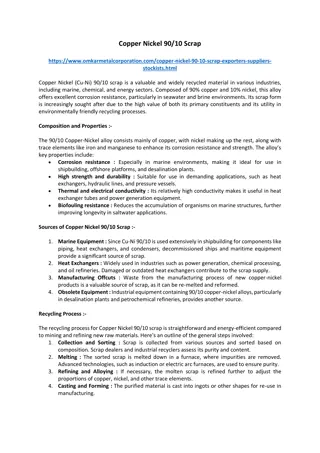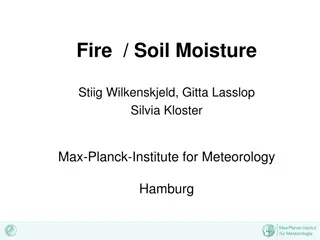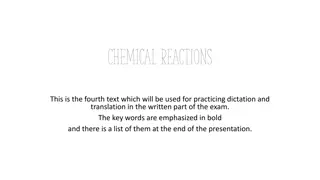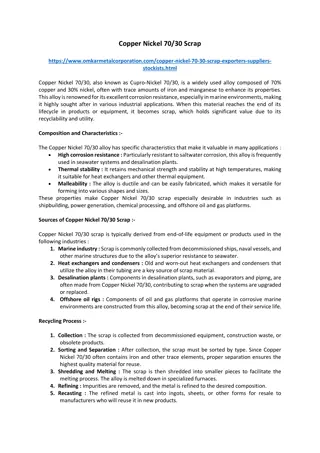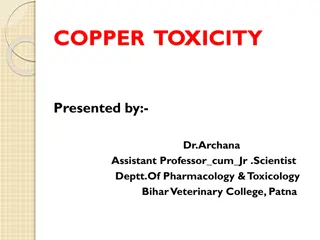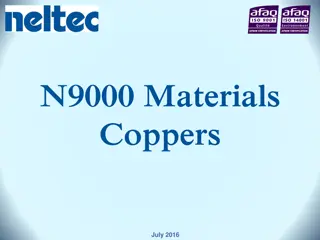Methanol Synthesis on Copper-Based Catalysts at Max Planck Institut
Methanol production using synthesis gas, studying CO2 hydrogenation for reduced CO2 emissions, and utilizing methanol as a hydrogen storage method are key areas of focus at the Max Planck Institut for Chemical Energy Conversion. The process involves methanol synthesis from CO2 and H2, with experiments conducted at varying temperatures, pressures, and gas mix ratios utilizing Cu/ZnO/Al2O3 catalysts. Gas chromatography analysis of liquid samples and the impact of temperature and pressure on methanol synthesis are also explored in this research.
- Methanol Synthesis
- Copper Catalysts
- Max Planck Institut
- Chemical Energy Conversion
- Gas Chromatography
Download Presentation

Please find below an Image/Link to download the presentation.
The content on the website is provided AS IS for your information and personal use only. It may not be sold, licensed, or shared on other websites without obtaining consent from the author. Download presentation by click this link. If you encounter any issues during the download, it is possible that the publisher has removed the file from their server.
E N D
Presentation Transcript
MAX-PLANCK-INSTITUT FR CHEMISCHE ENERGIE KONVERSION METHANOL SYNTHESIS ON COPPER-BASED CATALYSTS M.V. Bukhtiyarova
Introduction 1. Methanol production is a large industrial process. MAX-PLANCK-INSTITUT F R CHEMISCHE ENERGIE KONVERSION 2. Methanol is produced using synthesis gas at 250 C and 50 100 bars CO + 2H2 = CH3OH Catalyst: Cu/ZnO/Al2O3 3. High emission of CO2resulted in studying methanol synthesis through CO2 hydrogenation. 4. Methanol can be viewed as a way of hydrogen storage
Methanol synthesis CO2 + 3H2 CH3OH +H2O MAX-PLANCK-INSTITUT F R CHEMISCHE ENERGIE KONVERSION Methanol synthesis setup Gas mixture: H2:CO2= 3:1 Pressure: 30 and 50 bars Temperature: 190, 210, 230, 250 and 260 C GHSV: 4800 and 7200 h-1 S d-Chemie catalyst : Cu/ZnO/Al2O3 (old generation)
Gas chromatography of liquid sample Sample obtained at 250 C, 30 bar, 7200 h-1 MAX-PLANCK-INSTITUT F R CHEMISCHE ENERGIE KONVERSION Reference methylformate solution contains 5% of methanol Samples are dissolved in acetone to have reproducible results 400Wasser #87 [modified by gschmitz] pA TCD 1 - 68 [modified by gschmitz] 2 - 62 pA RSG-MS-017-13 Methylformiat 100 300 3 75 air 1 50 200 1 2 Reference methylformate acetone 2 2 25 100 1 2 Sample 1 min min -5 -10 0,00 1,00 2,00 3,00 4,00 5,00 0,00 1,00 2,00 3,00 4,00 5,00 6,00 7,00 No. Ret.Time Peak Name min 1 1.69 2 2.02 3 2.98 Rel.Area % 0.014 0.015 99.970 No. Ret.Time Peak Name min 1 2.50Methanol 2 3.31Wasser Rel.Area % 48.277 51.723 Methyl formate n.a. Methanol Traces of methylformate are observed during methanol synthesis
Methanol synthesis 1.4 50 CH3OH H2O GHSV = 4800 h p = 30 bar Ratio CH3OH/H2O, ml/ml 190 C MAX-PLANCK-INSTITUT F R CHEMISCHE ENERGIE KONVERSION 40 210 C -1 1.2 260 C 30 Volume, ml 250 C 230 C -1 GHSV = 4800 h 1.0 20 p = 30 bar 230 C 250 C 210 C 10 260 C 0.8 190 C 0 6 9 12 15 18 21 24 6 9 12 15 18 21 24 27 30 Time, h Time, h Methanol synthesis: Reverse water gas shift: CO2 + 3H2 CH3OH +H2O CO2 + H2 CO +H2O H = 49.7 kJ/mol H = 41.2 kJ/mol Ratio of CH3OH/H2O (ml/ml) = 2.24 Increasing temperature promotes water-gas shift reaction
Methanol synthesis Dependence on pressure MAX-PLANCK-INSTITUT F R CHEMISCHE ENERGIE KONVERSION 50 50 CH3OH H2O GHSV = 4800 h p = 50 bar CH3OH H2O GHSV = 4800 h p = 30 bar 40 40 -1 -1 260 C 250 C 260 C Volume, ml 30 30 Volume, ml 250 C 230 C 20 20 230 C 210 C 210 C 10 10 190 C 190 C 0 0 6 9 12 15 18 21 24 27 30 6 9 12 15 18 21 24 27 30 Time, h Time, h MS: CO2 + 3H2 CH3OH +H2O CO2 + H2 CO +H2O RWGS: According to Chatelier s principle increase of pressure results in higher methanol formation
Methanol synthesis Dependence on space velocity MAX-PLANCK-INSTITUT F R CHEMISCHE ENERGIE KONVERSION 50 50 CH3OH H2O GHSV = 7200 h CH3OH H2O GHSV = 4800 h p = 30 bar 260 C 40 40 -1 -1 260 C 250 C p = 30 bar 30 Volume, ml Volume, ml 30 250 C 230 C 20 20 230 C 210 C 210 C 10 10 190 C 190 C 0 0 6 9 12 15 18 21 24 27 30 6 9 12 15 18 21 24 27 30 Time, h Time, h Volume of formed methanol and water depends on reaction conditions
Methanol synthesis Dependence on space velocity at high pressure MAX-PLANCK-INSTITUT F R CHEMISCHE ENERGIE KONVERSION 50 50 CH3OH H2O GHSV = 7200 h p = 50 bar 260 C 250 C CH3OH H2O GHSV = 4800 h p = 50 bar 40 40 -1 -1 260 C 250 C Volume, ml Volume, ml 30 30 230 C 230 C 20 20 210 C 210 C 10 10 190 C 190 C 0 0 6 9 12 15 18 21 24 27 30 6 9 12 15 18 21 24 27 30 Time, h Time, h Volume of methanol and water does not practically change at temperature higher than 250 C
CO2conversion Dependence on pressure GHSV = 4800 h-1 Dependence on space velocity p = 30 bar MAX-PLANCK-INSTITUT F R CHEMISCHE ENERGIE KONVERSION 20 16 18 30 bar 50 bar 14 -1 4800 h 6000 h 7200 h 16 CO2 conversion, % CO2 conversion, % -1 12 14 -1 10 12 10 8 8 6 6 4 4 2 2 0 0 453 463 473 483 493 503 513 523 533 543 453 463 473 483 493 503 513 523 533 543 Temperature, C Temperature, K Conversion of CO2increase with temperature and decrease with space velocity
Methanol selectivity Dependence on pressure GHSV = 4800 h-1 Dependence on space velocity p = 30 bar MAX-PLANCK-INSTITUT F R CHEMISCHE ENERGIE KONVERSION 80 80 70 70 Selectivity CH3OH, % Selectivity CH3OH, % 60 60 50 50 40 40 30 bar 50 bar -1 4800 h 6000 h 7200 h 30 30 -1 -1 20 20 10 10 0 0 453 463 473 483 Temperature, K 493 503 513 523 533 543 453 463 473 483 Temperature, K 493 503 513 523 533 543 At high pressure selectivity practically does not change with temperature
Methanol yield Dependence on space velocity p = 30 bar Dependence on pressure GHSV = 4800 h-1 MAX-PLANCK-INSTITUT F R CHEMISCHE ENERGIE KONVERSION 8 8 30 bar 50 bar 7 7 -1 4800 h 6000 h 7200 h -1 6 6 Yield CH3OH, % Yield CH3OH, % -1 5 5 4 4 3 3 2 2 1 1 0 0 453 463 473 483 Temperature, K 493 503 513 523 533 543 453 463 473 483 Temperature, C 493 503 513 523 533 543 Methanol yield increases with temperature, pressure and decreases with space velocity
Activation energy Comparison with literature data MAX-PLANCK-INSTITUT F R CHEMISCHE ENERGIE KONVERSION 50 0,5 Activation energy, kJ/mol -1 4800 h 6000 h 7200 h 48 a -1 0,0 Ea = 48.7 kJ/mol -1 Ln(Rate(CH3OH)) 46 Cu/ZnO/Al2O3 Cu/ZnO -0,5 Ea = 48.2 kJ/mol 44 d a Ea = 44.9 kJ/mol -1,0 42 Cu/ZrO2 Cu/ZnO/Al2O3/Cr2O3 c 40 -1,5 b (a) Our data (b) H. Arakawa, Energy Conv. Mgmt: 33 (1992) 521 (c) X. Guo, J. Mol. Catal. A: 345 (2011) 60 (d) A. Karelovic, Catal. Today: 197 (2012) 109 38 -2,0 1,85 1,90 1,95 2,00 2,05 2,10 2,15 2,20 36 1/T, 1/K Obtained activation energy is in the agreement with activation energy presented in literature
Methanol synthesis Conditions for stability test: H2:CO2= 3:1; 30 bar, 230 C; 4800 h-1 MAX-PLANCK-INSTITUT F R CHEMISCHE ENERGIE KONVERSION 10 8 Yield CH3OH, % 6 4 2 0 0 50 100 150 200 Time, h 250 300 350 400 450 Productivity of methanol decreases during first 100 after that the catalyst works stable for another 300 hours
Methanol synthesis CO2 + 3H2 CH3OH +H2O Methanol synthesis: MAX-PLANCK-INSTITUT F R CHEMISCHE ENERGIE KONVERSION Gas mixture: H2:CO2= 3:1 Pressure: 30 bar Temperature: 190, 210, 230, 250 and 260 C GHSV: 4800 h-1 Clariant (S d-Chemie) catalysts 18 18 65 Old Catalyst New Catalyst Old Catalyst New Catalyst 16 16 60 Selectivity CH3OH, % 14 14 55 Conversion CO2, % Yield CH3OH, % 12 12 50 10 10 45 8 8 40 6 6 35 4 4 30 2 2 0 0 25 453 463 473 483 493 503 513 523 533 543 Temperature, K 453 463 473 483 Temperature, K 493 503 513 523 533 543 The old generation catalyst works better for CO2hydrogenation at low pressure
Conclusions MAX-PLANCK-INSTITUT F R CHEMISCHE ENERGIE KONVERSION 1. Methanol yield depends on reaction conditions: high pressure results in formation of higher amount of methanol 2. Practically pure methanol with trace amount of methylformate is produced 3. Clariant (S d-Chemie) catalyst for methanol synthesis is stable during long- term experiment for 400 hours 4. Clariant (S d-Chemie) catalyst of old generation is more suitable for production methanol by CO2hydrogenation
MAX-PLANCK-INSTITUT FR CHEMISCHE ENERGIE KONVERSION THANK YOU FOR YOUR KIND ATTENTION
Methanol yield MAX-PLANCK-INSTITUT F R CHEMISCHE ENERGIE KONVERSION Productivity CH3OH, kgMet/(kgcat*h) Productivity CH3OH, kgMet/(kgcat*h) 30 bar 50 bar -1 4800 h 6000 h 7200 h -1 -1 453 463 473 483 493 503 513 523 533 543 453 463 473 483 493 503 513 523 533 543 Temperature, C Temperature, C
Gas chromatography of liquid samples FID300 C 240 C 50 C H2 0,86 bar 2,3 ml 1:20 Instrument Column: Programm Method Report Agilent 6890 Stabilwax 30 m S-1 TCD 60 Wasser Rep Wasser Detektor Injector Tem.Programm Gas Split Injection Volume TCD250 C 250 C 80 C He 0,93 bar 1 ml 1:20 0.5 l Instrument 6890 Column: Programm Method Report Detektor Injector Tem.Programm: Gas: Split Stabilwax 30m S-69 Stabilwax Pyrrol Rep normal Injection Volume: 0.5 l The measurement using FID was done for determination organic impurities in methanol. FID does not detect water
